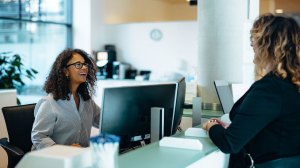‘Customer’ or ‘Client’? Either way we need to change



As the Professional Services sector adapts to the new digital world, is it time to rethink concepts and see the ‘client’ more as ‘customers,’?

Vincent Perrin
There’s a growing feeling that the Professional Services sector isn’t adapting to the changing needs and expectations of the new digital world. In fact, it can be argued that the sector is considerably behind most other industries and professions. In my opinion, we need to rethink the concept of the ‘client’ and see them more as ‘customers.’
Traditionally, Professional Services practitioners don’t really think of their clients as ‘customers’. When you look up the difference between the two concepts you get an interesting contract of definitions: customers buy products or (non-intellectual) services; clients pay for advice, experience, and high-trained intellectual services. You can understand why that contract has evolved. But the stark fact is that ‘clients’ now expect to be treated like ‘customers’ – just as they are in all other areas of their lives. Other sectors have been able to transform their customer experience at speed, but Professional Services haven’t been as nimble. That could harm the sector.
Some analysts put this down to the unique structure of many firms. They’re partnerships, run by the professionals whose work defines their strategy and how they serve clients. According to a recent Harvard Business Review analysis, the ‘value of a practice to clients rests on the skills of its professionals.’ They define the strategy of the firm. But, when it comes to adopting technology, this can be problematic, ‘At industrial or commercial companies, senior leaders can outline a strategy… and marshal support to execute it. But that top-down approach doesn’t work in Professional Services because of the fluid and constantly evolving nature of the firms’ two strategic assets; it’s professionals and its clients,’[1] says the HBR.
Salesforce for the Professional Services Industry
Find out how Salesforce is helping these organisations connect with their clients and employees.

Stay professional but be more customer-focused
What needs to change is not the deep intellectual skills of the partners and more junior members of the firm, but their attitude to how they define what they do for their clients/customers and how they do it. At Salesforce we believe that there is no distinction between a ‘client’ and a ‘customer’ – they are the same thing: a person in need of a service. Technology can transform the experience they get from professionals. It can help focus both the professional and the customer on outcomes rather than processes; on achieving something rather than billing for time.
But achieving that transformation demands a more holistic approach to IT projects. Professional Services firms tend, in my experience, to see them as something that’s separate from their core work. It’s a facilitator rather than something which could radically change how professionals interact with clients. That approach slows change, it results in unfocused IT that doesn’t live up to expectations. And it makes partners reluctant to invest more in tech that can really make a difference. And that difference isn’t just about delivering better experiences to clients, it’s about creating a much better employee experience too.
IT has transformed how people work. Digital technology has enabled employees to focus more on client-facing tasks rather than manual, routine ones. Salesforce focuses on change rather than just tech – the point is to use digital to improve experiences throughout the organisation. After all, great customer experiences are delivered by empowered employees.
Other sectors are making rapid progress
The Financial Services sector went through a similar learning curve. They used to call their customers ‘clients’ and that mindset resulted in a hands-off, rather distant relationship with customers. Many large institutions were also reluctant to adopt digital pathways for both internal processes and customer interactions. But the rapid rise of disruptive FinTech and challenger banks concentrated minds. In less than a decade the sector has been transformed. For most, a bank is now an app on their smartphone. And, of course, they also invested heavily in technologies which freed staff to be more customer-facing (and friendly). That all added up to the feeling that the financial institutions are on our side. They’ve made life easier for us.
That’s got to happen in Professional Services. PWC has embraced that idea. If you look at its insights into how to create and deliver great customer experiences,[2] it all makes sense. But what makes it even more powerful is that PWC is following its own advice. Salesforce has played – and is playing – a role in that. We’re facilitators of great customer/client experiences because we’re not just a CRM specialist: we’re a transformation engine and a platform that’s used in just about every other sector you can think of. Sectors which have realised that they need to rise to the challenges of increasing customer expectations. Use any word you like – client or customer – the outcome has to be a happy, satisfied individual who comes back for more.
PwC digitally transforms its global business by putting people first.
“We’ve only begun to unlock the power of the PwC network, and we could not have achieved it without Salesforce.”

If you’d like to know more about how we can help you know more – contact me directly…




















